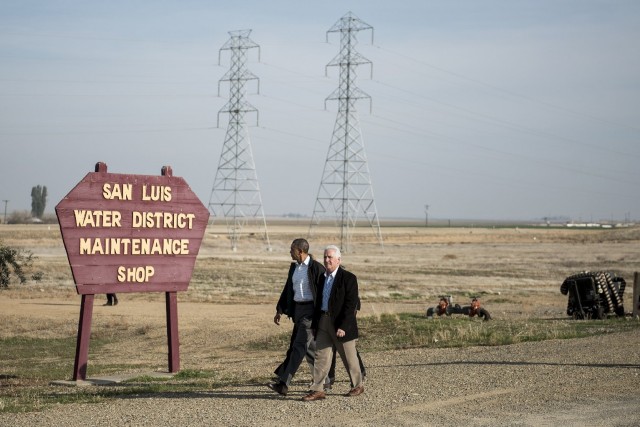Khokha: Well, really, the big-ticket item, Scott, is $100 million in livestock disaster assistance for farmers and ranchers in California. And the USDA is saying that it’s going to expedite that money by trying to get the program geared up to accept applications in 60 days, which apparently is much faster than they’ve been able to get money to farmers and ranchers in past disasters. There’s also some money to help farmers implement conservation practices to save water, there’s some money for rural communities in California experiencing water shortages that are worried about water quality. And here’s something interesting: as part of the package there are $60 million available to California food banks to help families affected by the drought.
Scott Shafer, Host: And I am sure all of that is appreciated, but of course what farmers really need is water. And not the president, not the governor, not any of us can make it rain. But I’m wondering, did he or anyone from the administration weigh in on some of the bigger issues like water storage, dams, that kind of thing.
Khokha: You know, I think they were very carefully avoiding talking about those long-term political issues. I caught up with Obama’s Agriculture Secretary Tom Vilsack at the Fresno airport before Obama’s plane landed, and he said the administration’s goal right now is immediate help. And that really means getting those dollars in the hands of farmers and ranchers whose livestock is dying, or whose tree crops might die if they can’t water them. You know, interestingly Vilsack also told me that despite the magnitude of this drought, he isn’t predicting that consumers are going to feel a big jump in food prices. He said looking at past droughts and the diversity of what’s grown around the nation, there might be slight spikes in prices or short-term crunches, but he doesn’t really anticipate a big squeeze on consumers. I thought that was pretty interesting.
Shafer: Yeah, kind of a little bit of good news there. As we said, the president toured a farm, Sasha, he had a community meeting and met not just with agriculture leaders and growers, but also with the United Farm Workers Union and a farmworker. What’s the significance of this, do you think?
Khokha: I think that’s really a recognition of the domino effect of this drought. If, as some agriculture organizations are predicting, farmers leave more than half a million acres fallow, don’t plant those acres this year, that could have a huge economic impact on jobs, not only for farmworkers, but for truckers, for people who work in packing houses …
Shafer: And, of course, Sasha, this has become a real political football partisan issue. House Republicans, as you know, are blaming Democrats for the drought, and they passed a bill to relax environmental restrictions, get some water to farmers, but the president says he’s going to veto that. So that’s kind of a nonstarter. I’m wondering what do people in The Valley make of being at the center of this political donnybrook?
Khokha: You know, I think people here in The Valley, particularly farmers, are happy that politicians of any stripe are paying attention to their issues. I mean, you know, the most powerful agriculture lobby here, the Westlands Water District, is supporting Democratic Sens. Feinstein and Boxer’s bill because I think they believe it’s the best and most reasonable compromise. They recognize that the GOP House bill, or any bill challenging environmental protections would die quickly in the Senate. And these are farmers that are die-hard Republicans.
Shafer: And just quickly, Sasha, I know that Gov. Jerry Brown has been in The Valley this week. He attended a farm expo down in Tulare County. How are people feeling about him?
